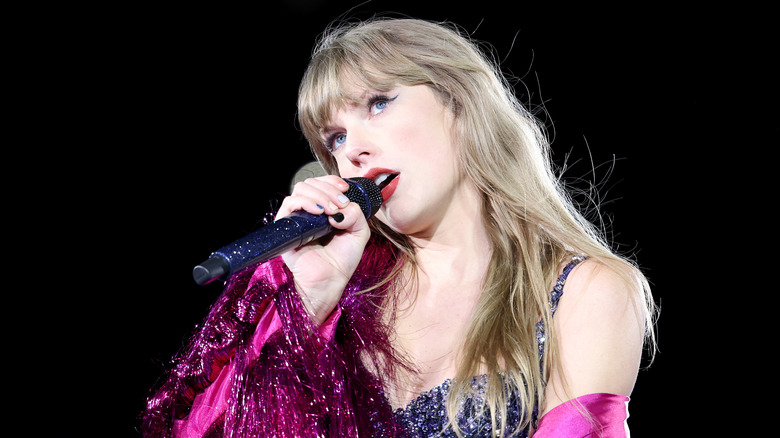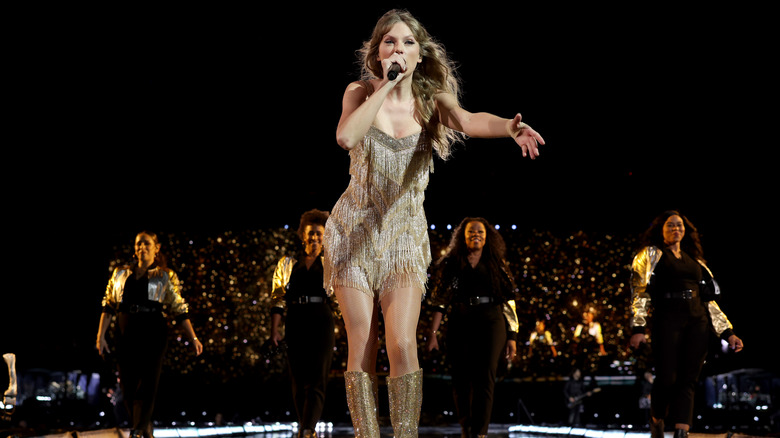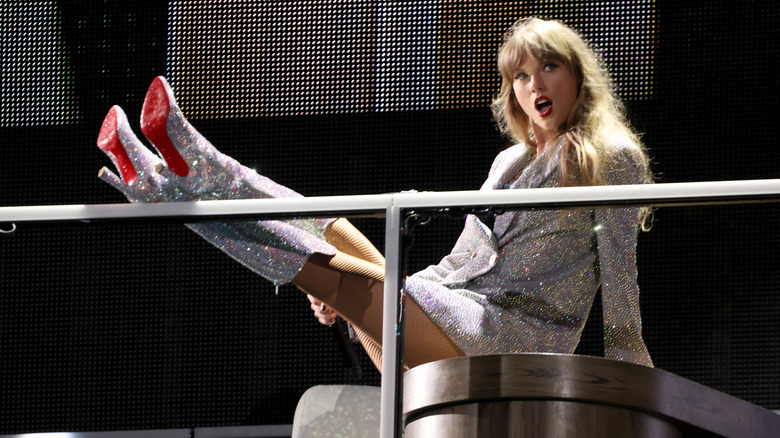Why Taylor Swift Can't Stop Releasing Her Own Versions Of Past Albums
Nearly a decade ago, ABC broadcaster Barbara Walters said, "Taylor Swift is the music industry," and those words hold true to this day. Swift released her debut album in 2006 and has stayed on top of the game ever since. The demand for her 2023 "Eras Tour" was unprecedented, with a sea of fans struggling to get tickets against Ticketmaster crashes and scalpers. But that didn't stop the fans who were unsuccessful in their quest as they gathered outside stadiums in the thousands to watch her performance.
In 2022, Swift's tenth studio album, "Midnights," which had several hidden meanings, as is her wont, broke numerous records. She was the first artist to occupy all ten spots on the Billboard Hot 100 with songs from a single album. "Midnights" also broke the modern-day record for single-week vinyl sales with 575,000 units sold. The album also garnered an astounding 549.26 million official streams in its first week alone, making it the biggest debut for a female artist ever.
It's rare to see someone retain their success over the years in the way Swift has, and she owes a large part of that to her songwriting abilities. She has written or co-written everything with her name on it. Early on, many of Swift's songs were about her life, and fans related to their vulnerability and honesty. So, naturally, they were unhappy to learn what happened to Swift's first six albums and why she has to re-release them as a result.
Here's why Taylor Swift is re-recording her first six albums
In a Tumblr post, Taylor Swift explained that her former record label, Big Machine Records, had sold her first six albums to Scooter Braun without her knowledge. Swift signed away ownership of her work to BMR in her first record deal at 15. The singer-songwriter explained that she couldn't bid on the master recordings of her work but could "earn" each album back by making six new ones.
In the post, she penned, "This is what happens when you sign a deal at fifteen to someone for whom the term 'loyalty' is clearly just a contractual concept. And when that man says 'Music has value', he means its value is beholden to men who had no part in creating it." Swift wasn't too happy that Braun owned the music she put her heart and soul into especially since he was publicly involved in Swift's feud with his then-client, Kanye West.
She wrote, "All I could think about was the incessant, manipulative bullying I've received at his hands for years." Swift tweeted that she had tried negotiating with Braun for her music, but the company asked her to sign an NDA that prevented Swift from speaking negatively of Braun and confirmed that he would continue to profit from her work, which she understandably took issue with. However, the BMR contract stipulated that Swift could start re-recording her old music starting in November 2020.
The singer is trying to change the industry with this move
Taylor Swift stands to benefit the most from the expensive and risky move of re-recording her music. If someone wanted to use Swift's old music in media, they would require her consent along with Big Machine Records. In that case, Swift would get paid royalties determined by the label. But with the re-recorded versions, Swift gets creative control over licensing and a bigger portion of the royalties. Additionally, her re-recorded versions devalue the ones she doesn't own.
Swift can block their licensing and significantly reduce streaming royalties by getting fans to exclusively stream the re-recorded versions. In a 2019 Billboard interview, she talked about why licensing is imperative to her: "The reason I'm re-recording my music next year is because I do want my music to live on. I do want it to be in movies, I do want it to be in commercials. But I only want that if I own it."
A couple of years later, Swift told Zane Lowe that she was also fighting to help other artists own their work: "I'm having lots of conversations behind-the-scenes with record labels, trying to help them understand the psychological impact of separating an artist from their work." She added, "I really just want to make things better for other people and I want that to start at the record deal in the contract. Artists should never have to part with their work." By the end of 2023, she'll have at least three re-recorded albums out.


